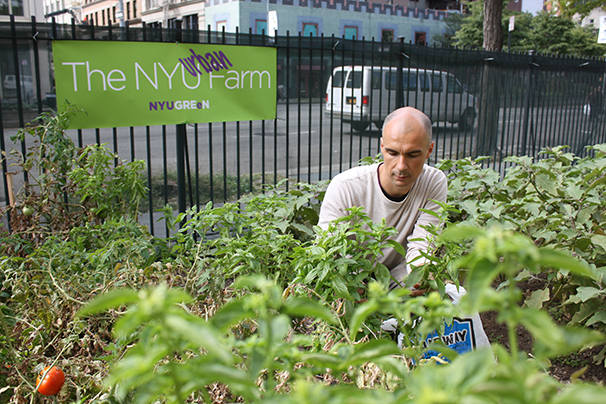NYU Farm Lab teaches agricultural awareness
November 13, 2014
It is common for NYU students to visit the Metropolitan Museum of Art or the Museum of Natural History for class, but visiting a small farm in the middle of downtown Manhattan is more unusual. Professor Laurel Greyson’s “Intro to Urban Agriculture” Steinhardt class regularly visits and works with the 0.125 acre NYU Urban Farm Lab, located at Houston and Wooster streets at 110 Silver Towers.
Greyson’s two-credit course is administered by the Department of Nutrition, Food Studies and Public Health and is open to all students. The class gives students the hands-on experience of working with nature at the farm lab. Beginning in 2013 with just one section, the class has grown to three sections, indicating an increased interest in and awareness of sustainable farming.
Greyson considers the farm lab a unique teaching aid.
“This is an exciting way to get connected to our food,” Greyson said. “By means of this farm, people can learn what soil is all about, what a kale plant looks like and so on.”
Since non-NYU students can also stop by and ask questions, the farm lab serves as a means of spreading awareness about where food comes from.
This season, the farm is growing produce such as tomatoes, melons and peppers in a completely eco-friendly way. Crop rotation and compost are used instead of chemicals to ward off pests, control weeds and maintain the fertility of the soil.
During harvest season, students can take a substantial part of the harvest home with them and learn about preservation techniques by canning the produce they harvest.
Steinhardt food studies graduate student Maricruz Iniguez noted the benefits of the hands-on experience.
“The fact that you can actually be the one sowing the seeds, taking care of the farm and then harvesting, is great for me because I find it easier to learn while practicing the concepts that are being taught,” Iniguez said.
Although the farm is funded by an NYU Green Grant, the upkeep of a farm in such a large, urban city with limited space has still been challenging, Greyson explained.
“Sound engineering options are required to make the best possible and innovative use of the available space,” Greyson said. “This requires substantial funding.”
At the same time, Greyson emphasized the need to have fair financial compensation for the cultivators who work on such urban farms.
“The value of the crops is to be respected,” Greyson said. “Thus, the people who work in such urban farms should get proper financial compensation.”
The city has already started moving toward sustainability. Farmers markets like the one held at Union Square are fairly popular. Buying locally rewards farmers for their efforts and gives impetus to healthy and sustainable farm produce as opposed to processed foods.
“The most important thing about sustainable agriculture that I’ve learned is that it can be done,” Iniguez said. “While agriculture is a very physical job, it is also a rewarding one.”
A version of this article appeared in the Thursday, Nov. 13 print edition. Email Tejas Sawant at [email protected].












































































































































